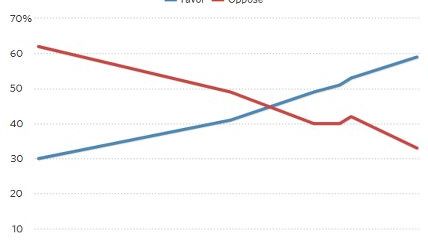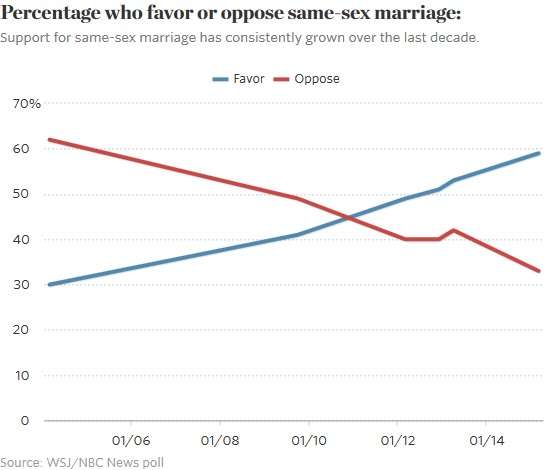Polls Show More and More Support for Gay Marriage. Will GOP Candidates Let It Go?
Rand Paul continues trying to thread the needle with "private contract" argument.

An NBC/Wall Street Journal poll has support for gay marriage recognition in the United States at its highest point yet, with 59 percent giving the thumbs up. Support for gay marriage has nearly doubled over the course of just a decade:

So the big remaining unknown about gay marriage will be how prospective Republican candidates are going to be dealing with it during the primaries. The Wall Street Journal notes that the core of the Republican Party is still reluctant to embrace the change:
However, the issue still poses some risk to GOP candidates facing a spirited presidential primary. Among core Republican voters — the party's most committed followers — opposition is far stronger, with only 29% saying they support gay marriage.
When Republican primary voters were asked in the new survey how their view of candidates would be affected by support for gay marriage, 50% said it would make them less favorable to candidates, 19% said it would make them more favorable.
Those Republican poll numbers contrast with a previous poll that showed a slight majority of Republicans in early primary states found opposition to gay marriage to be "unacceptable" in a candidate. Washington Post writer Aaron Blake may have been right after all when he worried that the wording of the questions in the previous poll was too confusing.
A few days ago Sen. Rand Paul was interviewed by Fox News and asked to explain his position on gay marriage. He stuck to his guns that he personally thinks marriage should be between a man and a women but the entire fight could be avoided or dealt with by allowing for contracts between adults:
He said the idea of gay marriage "offends" him and some others, so you can guess which part of his response ended up in headlines. But notice something interesting in this coverage of Paul's comments over at gay magazine The Advocate: It engages with Paul's libertarian leanings and his idea of marriage as a private contract. I've noticed in a couple of other gay (nonlibertarian) blogs as well that actually address the full concept of what Paul is proposing, not just his personal opposition to gay marriage.
Is this significant? Typically Paul is lumped in with other conservatives by liberal or progressive gay marriage supporters, the nuances of Paul's positioning lost. But that's not quite what's happening this time, headlines aside. This isn't like the time the Human Rights Campaign completely mischaracterized his support for "traditional" marriage as support for a constitutional amendment against same-sex marriage recognition. The Advocate even points out that libertarians are typically much more supportive of gay marriage than Paul is showing in his interviews. I am used to seeing the "Libertarians are just Republicans who want to smoke pot," refrain in gay blogs and deep suspicion that the "get government out of marriage" private contract argument is cover for some attempt to create a "separate but equal" segregation system with marriage that isn't really equal at all.
It may well be a reflection that gay marriage is winning as an issue that everybody is paying closer attention to the complexities on the positions of those on the right. With the signaling from the Supreme Court suggesting that the fight may be over—as a legal matter, anyway—by the end of June, we may see more interest in how each Republican candidate deals with this new reality, not just by libertarians and Republicans interested in influencing the outcomes of the primaries, but by progressives and Democrats looking at who they'll be facing in 2016. Paul's policy position (as abstract as it is) may seem a lot less hostile to same-sex couples than Sen. Ted Cruz's proposed constitutional amendment to keep marriage a state issue. As such, arguments against whoever lands the GOP nomination that are targeting gay voters (or voters who are very supportive of gay issues) may need adjustments depending on who it is.
Oh, and note that Paul didn't go the federalism route with his response that states should decide for themselves, which he had argued before was a way for more conservative states to avoid recognition. That has become Cruz's position.


Show Comments (114)